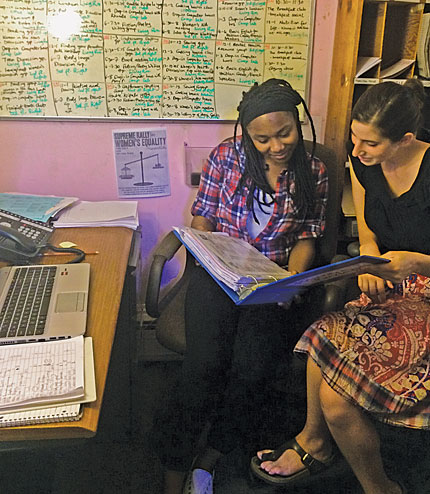By: Clara Lefton/TRT Reporter—
CAMBRIDGE, Mass.—Discrimination against lesbian, gay, bisexual, transgender and queer people has been a hot topic in the media recently after Indiana passed its Religious Freedom and Restoration Act, RFRA. The religious objections bill would have allowed organizations and businesses to legally discriminate against the LGBTQ community. However, significant backlash quickly had the bill overturned. The state of Arkansas also attempted to pass a similar law.
LGBTQ Americans are often forced to cope with the daily emotional stress of these discriminatory laws and policies, especially in the workplace. Recently, The Cambridge Women’s Center in Cambridge, Mass. introduced a support group specific to the challenges of being LGBTQ in the workplace for people who identify as a woman. The meetings take place on the first Tuesday of every month from 6-7 p.m.
“I’ve been actively looking to expand our LGBTQ programming,” said Katie Heimer, coordinator for programming and outreach at The Cambridge Women’s Center. “We did a training recently for volunteers on LGBTQ inclusivity and resources. It’s an area that I really want to see further grow at the Center.” [pullquote]“I knew no one would judge me negatively, but the heteronormativity of the corporate workplace can be daunting, especially for a flaming liberal like myself.”[/pullquote]
The group itself was developed by a volunteer, Megan Riesz, who has weekly difficulties navigating her professional life and being a part of the LGBTQ community. Assisting Riesz in volunteering to run the new group is her partner Sydney Moyer, who has also experienced similar issues in the workplace.
“I’m not always a confident person and when I first started my latest job, which is my second out of college, it felt weirdly awkward to mention my girlfriend to people,” Riesz explained. “It felt like I had to ‘come out’ over and over again, especially because I’m fairly straight-presenting, and that was really annoying. I knew no one would judge me negatively, but the heteronormativity of the corporate workplace can be daunting, especially for a flaming liberal like myself.”
The Cambridge Women’s Center has served as a safe space for women since 1971 and is located in a formerly Harvard University-owned building on Memorial Drive. Its services range from counseling to a variety of other support groups and a helpline. The Center is led by a small staff and consists mostly of volunteers.
Although Massachusetts has a long history of being on the liberal side of social and cultural issues, the new group seems to be a groundbreaking concept for the area.
“It’s really important that safe spaces exist to talk about the realities that we face both as trans people and as the larger LGBTQ community around employment, and general challenges that we face in a world that doesn’t always understand,” said Mason Dunn, executive director of the Massachusetts Transgender Political Coalition (MassTPC). “But having a space specifically dedicated to workplace, I don’t know of anything beyond this. This is new in that front.”
Massachusetts is still behind other states with laws against discrimination of transgender people by failing to provide public accommodations protections. Dunn remains confident that a religious freedom bill would not pass in the state, and is more focused on passing a public accommodations bill. MassTPC has teamed up with organizations like MassEquality, Gay & Lesbian Advocates & Defenders (GLAD), Boston Alliance of Gay, Lesbian, Bisexual & Transgender Youth (BAGLY), and the American Civil Liberties Union (ACLU) of Massachusetts to fight for these concerns.
“The definition of public accommodations includes any place open to the public, so we’re talking about public transportation, hospitals, any place that’s open to public use is a public accommodation,” Dunn further explained. “At this moment in Massachusetts law, public accommodations discrimination is perfectly legal on the basis of gender identity or gender expression, and we’re looking to remedy that major oversight in law through a bill that is both a House Bill and a Senate Bill in the state.”
Meanwhile, while the state does have workplace protections for LGBTQ people, The Women’s Center continues their support for people dealing with more subtle, but still troubling, biases experienced at work.
“My girlfriend and I would come home at the end of the day and talk about how frustrated we were that we didn’t feel like everybody else at work, that our straight counterparts had this privilege of talking about their significant others without question marks dancing in anyone’s heads,” Riesz reflected.
To learn more about The Cambridge Women’s Center visit www.cambridgewomenscenter.org. For more on MassTPC, visit www.massptc.org.








